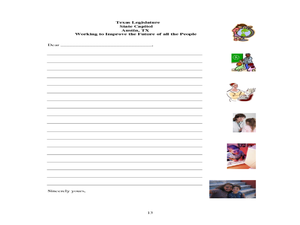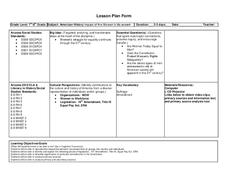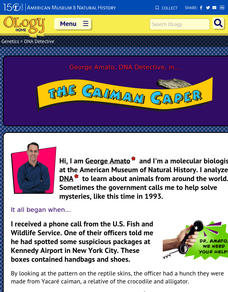Curated OER
Women in Texas Politics: Winning the Vote, Three Pioneers, and Serving the People
Fourth graders study women's involvement in Texas politics. In this US history instructional activity, 4th graders discuss woman suffrage, examine three Texas female pioneer legislators by reading biographies, and explore women's issues...
Code.org
Good and Bad Data Visualizations
Good versus bad data. Pairs rate online collections of data representations from good to bad and then suggest ways to improve the visualizations. The class then creates a list of best practices and common errors in data representations...
Beyond Benign
Can You Hear Me Now? Cell Phone Accounts
How sustainable are cell phones? Throughout the unit, learners explore the issues around cell phones concerning sustainability. Class members take a graphical look at the number of cell phones across the world using a box-and-whisker...
American Battlefield Trust
Antietam 360
It was the single bloodiest day in Civil War history. Now, class members have the opportunity to walk in the footsteps of soldiers who fought in the Battle of Antietam using an interactive website. Supplemental resources include...
Missouri Department of Elementary
Happy, Sad, Scared and Mad: All Belong To Me
"What are feelings?" and "Why are feelings important to understand?" are the essential questions of a lesson that boosts self-awareness. Scholars discuss the four basic emotions—happy, sad, scared, and mad—in preparation for a creative...
Alabama Department of Archives and History
Cells for Sale - Convict Leasing in Alabama
The benefits and drawbacks of convict leasing following the Civil War are the focus of a lesson that asks groups to examine primary source materials to gain an understanding of the program before individuals decide whether they are in...
Alabama Department of Archives and History
What Were They Thinking? Why Some Some Alabamians Opposed the 19th Amendment
To better understand the debate over the 19th Amendment, class members examine two primary source documents that reveal some of the social, economic, racial, and political realities of the time period.
Youth Leadership Initiative
Selecting a President: Primaries and Caucuses
What is a party caucus anyway? And what part do caucuses play in the primaries? Everything future voters need to know about the four stages in the presidential selection process is provided by this resource. The 2012 US Presidential...
Channel Islands Film
Cache: Lesson Plan 4 - Grades 4-5
After viewing the West of the West's documentary Cache, individuals craft either a newspaper article chronicling the discovery of the cache on San Nicolas Island, a historical narrative of the placement of the cache in the cliff side, or...
Curated OER
What is an Atlatl?
Let's go an an archaeological dig! Prepare your kids with a list of vocabulary terms relating to archaeology, including different types of items that one might find. They study pictures of each item and play a memory game based on the...
Curated OER
Child Safety
Explore reading comprehension and child safety in this young adult literacy lesson. High schoolers practice using context clues to figure out word meanings after observing a teacher model this process. They read an article about child...
National Endowment for the Humanities
Revolution '67, Lesson 2: What Happened in July 1967? How Do We Know?
Even in a world in which dozens of participants and curious onlookers record every controversial event, the basic facts of what happened are often in dispute. Revolution '67, Lesson 2 explores 1967 Newark, New Jersey using an examination...
Houston Independent School District
Creating a Successful Project
Guide your learners step by step through the process of designing an original, independent student project. This resource includes a wealth of worksheets and materials, including student project checklists, timelines, primary and...
Channel Islands Film
First Contact: Lesson Plan 4 - Grades 5-6
After watching Treasure in the Sea, a documentary about Channel Islands National Park and the video First Contact, about the voyage of Juan Rodríguez Cabrillo to the Channel islands, groups research and then compare the experiences of...
Alabama Department of Archives and History
Conflict in Alabama in the 1830s: Native Americans, Settlers, and Government
To better understand the Indian Removal Act of 1830, class members examine primary source documents including letters written by Alabama governors and the Cherokee chiefs. The lesson is part of a unit on the expansion of the United...
Curated OER
Grade A: The Market for a Yale Woman's Eggs by Jessica Cohen
What would it be like to sell your eggs to a couple who can't have children on their own? Could you even imagine it? As most of us have never been in this position, this descriptive essay is really quite interesting. The reading itself...
Crafting Freedom
The Self-Empowerment of Harriet Jacobs
In a hands-on learning activity, pupils read about and recreate the experience of Harriet Jacobs, author of one of the most famous slave narratives of all time in which she describes her years of hiding from her master in a confined...
PBS
An Attack on Syria- What Would You Do?
Has United States military intervention in the conflicts of other countries always been warranted? After reviewing a brief background on contemporary US conflicts and reading articles describing the civil war in Syria, your learners...
Arizona Department of Education
American History Impact of the Women’s Movement
Take a look at important images that depict the women's suffrage movement, the support for the Equal Rights Amendment, and wage equity for women over the last two centuries. As class members work through a lesson on primary source...
Reed Novel Studies
One Crazy Summer: Novel Study
Rita Williams-Garcia's One Crazy Summer describes three girls who go looking for their mother who ran out on them. Scholars complete a novel study guide with vocabulary exercises, character descriptions, and comprehension poems.
Messenger Education
Look But Don’t Touch—Exploration with Remote Sensing
Mars is home to the tallest mountain in our solar system, Olympus Mons. In this set of two activities, learners review geologic land formations through the analysis of aerial maps. They then apply this knowledge to aerial maps of objects...
Florida International University
The Good, the Bad and the Nasty Tasting
Examine the benefits of chemical defense mechanisms. Organisms in oceans use chemicals to ward off predators. Duplicate this adaptation using a hands-on experiment in which you ward off your predators (your pupils) with some bad-tasting...
Reed Novel Studies
Old Yeller: Novel Study
Fred Gipson's Old Yeller tells of a stray yellow dog who becomes the best friend a boy could ever have. While reading the novel, learners complete sentences with new vocabulary words, answer comprehension questions, and create...
American Museum of Natural History
DNA Detective
Match up the DNA code. Pupils read the website from the American Museum of Natural History about how DNA can determine whether a skin is from a particular type of reptile. Using the same technique, learners match up products with the...
























